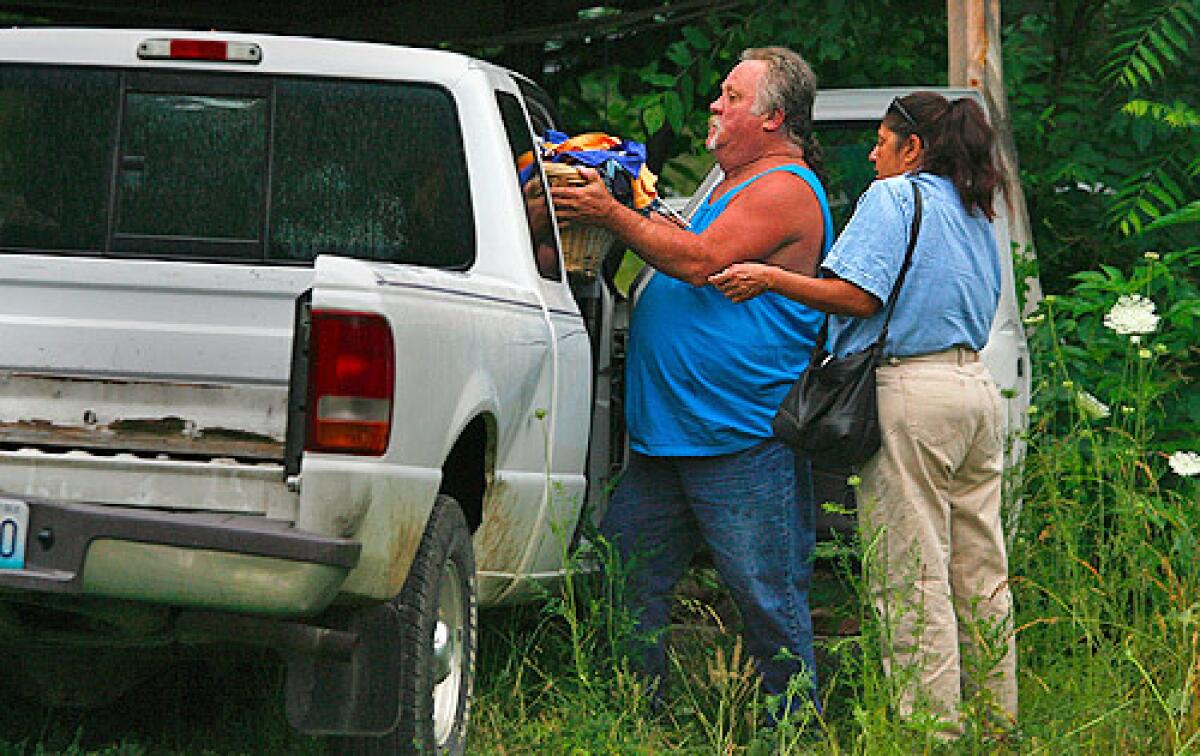Missouri family struggles to stay above water

- Share via
WINFIELD, MO. — Bill and Virginia Russell woke up Friday morning at his brother’s place. It was messy and cramped. But it was also high in the hills above the ungovernable Mississippi River, which, at present, was coursing through the couple’s split-level ranch house on the flood plain below.
Their four dogs were in a small pen in the brother’s backyard, safe and dry. The cat was around somewhere. So far so good.
But when the brother came home from his road trip, they knew, this two-bedroom house would be too small for them. The couple would spend one more night here, tops.
But then where?
“I don’t know,” said Virginia, 57, brushing her black hair vigorously, as if she were combing out the worry. Her morning shift at the grocery store started soon.
“I want to get away from the water,” Bill offered wearily. “I don’t want to look at it no more.”
Maybe the Russells would leave this little river community they called home for 22 years. Maybe they would drive to her mother’s condo in St. Louis, an hour south. Maybe they would spend some precious cash on a hotel.
Or maybe they would go back to the high school shelter. They spent Thursday morning there, eating turkey and bologna sandwiches and plotting their next move as part of the Midwest’s vast new contingent of the displaced.
The Federal Emergency Management Agency has not determined how many homes have been ruined by this month’s floods, but the agency has already signed up 36,000 people for assistance in Iowa, Indiana and Wisconsin. Numbers are harder to come by in Missouri, where hundreds of soldiers and volunteers are expected to fight through the weekend to keep the rising waters out of a string of small communities stretching from the St. Louis suburbs to the Iowa line.
The upheaval will probably be less visible to the nation than the aftermath of Hurricane Katrina. FEMA officials believe they will be able to find rental housing for most of the displaced in properties close to work and homes. In tight-knit communities like Winfield (pop. 1,200), friends and family appear to have absorbed the newly homeless, at least temporarily. Though at least 350 homes in Lincoln County have been flooded, the Winfield High School shelter had only seven people sleep there Thursday night.
Yet the outlook seems particularly bleak for families like the Russells, who were already struggling to stay afloat in a turbulent economy.
Bill, 56, lost his job at a cable company in August 2006; he later began collecting a disability check for a number of ailments, including asbestos-related lung disease. His wife, a cancer survivor, is on enough prescription medications to fill a small duffel bag. She is paying for them out of her pocket while waiting to become eligible for the health insurance plan her employer offers.
It is too late for flood insurance, however. They were covered the last time their house was inundated, during the great floods of 1993. But that was when they had better jobs, better pay. More recently, they decided they couldn’t afford the rates.
Bill -- a heavyset man with a sandpaper Southern accent -- went down to see their place Thursday night. The water around the house was waist-high from numerous breaches in the levee on the river’s west bank, a few miles away. He decided he wasn’t going back until the house was dry.
“It’s too dang depressing,” he said. “I ain’t gonna go down there till I can walk back in the house.”
Their neighborhood, Winfield Acres, lies just outside a secondary levee system built to protect the city’s downtown. It is on the low-lying east side of the town, the kind of place that farmers upriver call the bottoms.
Winfield Acres suffered two other significant floods in recent memory, in 1973 and 1993. When white-collar commuters began streaming in a few years ago, they stuck to the hills that rise to the west of town. Winfield Acres, for some, took on a defining scruffiness. Neighbors like Jeff Scott, 38, moved away; he thought there was a methamphetamine problem.
The Russells stayed and raised two boys in their house. The place wasn’t perfect, but they knew all their neighbors, and when the weather was good they boated and fished and barbecued by the river.
After the 1993 flood, FEMA bought a number of properties in the neighborhood, but the Russells stayed and rebuilt. Their reasoning echoed the sentiments of New Orleans 9th Ward block captains and of die-hard Californians undaunted by the fault lines.
“It was home,” Virginia said.
This time around, they had time to prepare. In the last few days, their neighbors helped them move out 13 rooms’ worth of stuff: the TVs, the heirloom furniture, the piles of clothes, Virginia’s collection of clown statuettes.
On Friday, their belongings were spread all over Lincoln County, in storage lockers and at friends’ houses.
Virginia wondered how they would pull it all together again. She said they don’t have much money to rebuild. Nor do they have the money to buy another place. “I just don’t know,” she said, “what’s going to happen to us.”
Times staff writer Jenny Jarvie contributed to this report.
More to Read
Sign up for Essential California
The most important California stories and recommendations in your inbox every morning.
You may occasionally receive promotional content from the Los Angeles Times.










